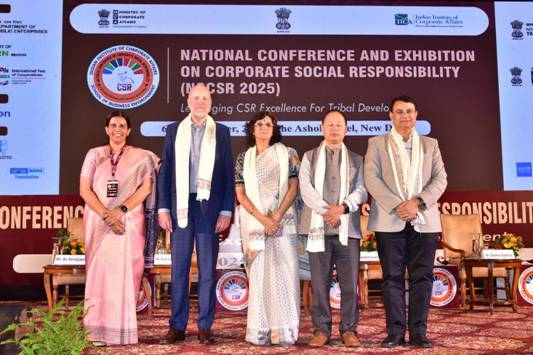National Conference on CSR for Tribal Development Calls for Inclusive, Data-Driven Action
The valedictory ceremony opened with a vibrant cultural performance, showcasing India’s diverse tribal heritage and its enduring role in shaping sustainable and resilient communities.

- Country:
- India
The Valedictory Session of the National Conference & Exhibition on “Leveraging CSR Excellence for Tribal Development” concluded on 7th October 2025 in New Delhi, marking a major milestone in India’s efforts to align Corporate Social Responsibility (CSR) with national priorities for tribal welfare and sustainable development.
Organised by the Indian Institute of Corporate Affairs (IICA) under the Ministry of Corporate Affairs (MCA), Government of India, the two-day event celebrated the 2nd Annual CSR Day, held in commemoration of Mahatma Gandhi’s birth anniversary, underscoring the principle of social responsibility in business.
With participation from over 400 delegates — representing government agencies, public sector enterprises, industry associations, academia, and civil society — the conference focused on fostering collaboration, innovation, and inclusivity as the key drivers of tribal development through CSR.
Celebrating Tribal Heritage and Sustainable Futures
The valedictory ceremony opened with a vibrant cultural performance, showcasing India’s diverse tribal heritage and its enduring role in shaping sustainable and resilient communities. The performance symbolised the conference’s central theme — blending cultural preservation with innovation to build “Smart, Sustainable, and Self-Reliant Tribal Economies.”
Secretary DPE: CSR Must Empower, Not Merely Support
Delivering the Special Address, Shri K. Moses Chalai, Secretary, Department of Public Enterprises (DPE), called upon Central Public Sector Enterprises (CPSEs) to move beyond short-term welfare projects and engage in long-term, scalable CSR programmes that empower tribal communities.
“CSR must become a tool for empowerment, not mere assistance. Our vision for Viksit Bharat 2047 must include self-reliant tribal economies built on skills, digital inclusion, and entrepreneurship,” Shri Chalai said.
He stressed the need for well-defined CSR objectives, measurable outcomes, and transparent evaluation frameworks to ensure lasting social and environmental benefits. He also urged CPSEs to work closely with state governments, local administrations, and civil society organisations, integrating CSR efforts with grassroots needs.
Shri Chalai reiterated DPE’s call for strategic CSR investments in education, skill development, healthcare, and digital empowerment, particularly in tribal-dominated and underserved regions.
Secretary MCA: Revamping CSR for Greater Convergence
In her Valedictory Address, Smt. Deepti Gaur Mukerjee, Secretary, Ministry of Corporate Affairs, commended IICA for creating a unique platform for dialogue and partnership between policymakers, corporate leaders, and community practitioners.
Announcing a significant initiative, she proposed the development of a revamped “CSR Exchange” — a digital collaboration platform that would connect government and corporate entities, enabling project mapping, partnership opportunities, and the exchange of best practices and impact stories.
“The CSR Exchange will serve as a one-stop digital ecosystem for collaboration, transparency, and innovation in social development,” Mukerjee explained, inviting volunteers and stakeholders to contribute to its design.
She emphasised that community participation and local leadership are fundamental to the sustainability of CSR projects. “Communities must not be passive beneficiaries but active architects of their development. CSR must nurture ownership, not dependence,” she said.
IICA CEO: Making CSR Data-Driven, Technology-Integrated, and Equitable
Shri Gyaneshwar Kumar Singh, Director General & CEO of IICA, articulated the importance of transitioning from philanthropy-based CSR to outcome-oriented CSR that integrates technology, data analytics, and innovation.
He emphasised the need for real-time monitoring systems using AI and analytics to track progress and enhance accountability. “CSR must focus on measurable impact, not fund disbursement. It should harness technology and managerial capabilities to create sustainable change,” Shri Singh asserted.
Highlighting regional disparities, he noted that certain areas such as the North-East remain underfunded in CSR allocations. He called for geographically balanced, data-driven, and need-based interventions, supported by greater investment in research, innovation, and capacity-building.
“Tribal development demands a convergence framework—bringing together government, corporates, and academia to co-create sustainable solutions for Viksit Bharat 2047,” he said.
UNICEF: CSR as a Tool for Human Rights and Inclusion
Mr. Bo Beiskjaer, Chief, Resource Mobilization & Partnerships, UNICEF India, framed CSR as a transformational mechanism that connects corporate purpose with human rights and child welfare.
“CSR is not charity; it is shared value creation. It must advance dignity, equity, and inclusion,” he stated, highlighting UNICEF’s partnerships with corporates in improving health, education, and employability outcomes for tribal children.
He urged the corporate sector to adopt co-created, community-led solutions, ensuring that every CSR project contributes to India’s journey toward inclusive and equitable growth.
IICA’s Academic Insights: CSR for Cultural and Economic Empowerment
Dr. Garima Dadhich, Head, School of Business Environment, IICA, presented the conference report summarising key sessions. She advocated for consultative, culturally sensitive project design, integration of traditional knowledge systems, and promotion of indigenous crafts and GI-tagged products as sustainable livelihood solutions.
“CSR must empower tribal communities to become custodians of their resources and heritage,” Dr. Dadhich said, stressing the role of data, design thinking, and innovation in scaling tribal entrepreneurship.
Acknowledgments and Partnerships
In her vote of thanks, Dr. Dadhich expressed gratitude to the Ministry of Corporate Affairs, Ministry of Tribal Affairs, Ministry of Development of North Eastern Region, and the Department of Public Enterprises for their institutional support.
She also acknowledged the conference’s lead partner HCL Foundation, exhibition partner TRIFED (Tribal Cooperative Marketing Development Federation of India), and supporting partners including GAIL (India) Ltd., Indian Oil Corporation Ltd., UNICEF, Partners in Change, Amrita Vishwa Vidyapeetham, and Spark Minda Foundation.
The event featured 34 exhibitors showcasing CSR innovations in education, health, sustainable livelihoods, and digital inclusion, further strengthening the bridge between policy, practice, and community impact.
Towards Viksit Bharat 2047: CSR as a Catalyst for Tribal Empowerment
The conference concluded with a collective call for a national convergence framework uniting government, corporates, and civil society in achieving tribal empowerment through sustainable CSR.
By promoting data-driven accountability, community ownership, and innovation-led development, the participants reaffirmed CSR’s transformative potential in achieving Viksit Bharat 2047 — a vision of an inclusive, self-reliant, and prosperous India where tribal communities are equal partners in progress.










